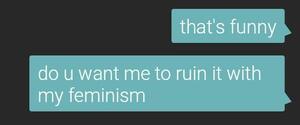I Walk the Line: The Shaky Tightrope of Male Validation
Freshman year, my new friend John (name changed to protect the male ego) made a lot of gay jokes, and I laughed at every one of them. He would make all these jokes about Jews, egged on by his Jewish friends, and I laughed at every one of them. Freshman year, John would joke about rape, and when I didn’t laugh, John laughed at me.
My time in high school has felt a bit like a balancing act. When all I wanted was to be in John’s friend group and for him to think I was cool, I pushed aside the indignation I felt as a feminist because I didn’t want him to think I was lame. When John told all our friends that I was probably really perverted, I laughed and agreed because I wanted to be “fun and chill”- never mind that I was 14. I wanted these boys to think I was worth hanging out with. I was fixated on making new friends in high school, and I thought this was the way to do it. So I became obsessed with being one of the guys and thought that meant shrugging off what I knew was wrong.
Male validation was really important to me, and I thought that if these guys thought I was funny, then I definitely was. So I started making offensive jokes like them. This didn’t help my case when I tried to point out that something one of them said had crossed the line. After all, if I was partaking in the humor then my objection was hypocritical. So when the K-word was written on a bathroom stall and my friends found it funny, I pretended I did too. I don’t want to pretend I was an innocent party in all this. I should have said something to my friends. However, I think it’s interesting how the desire for male validation can silence women.
Nowadays we hear a lot about the “cool girl,” and I wanted nothing more than to be her. I adopted my male peers’ opinions because I wanted them to like me. I teased my two guy friends about being gay for each other, and I made a lot of jokes that unwittingly affirmed the stereotypes my peers held about Jews and women. And worst of all, I bad–mouthed other girls because I was jealous and didn’t want them taking away my guy friends. This is why I am so passionate about combatting girl hate. Girl hate is when women or girls put each other down to elevate themselves in our patriarchal society. I engaged in this bad behavior because I wanted validation from my male friends, but I’ve since realized how wrong this was, and now I actively encourage girls I know to stick together and stick up for one another.
I would like to say that this experience taught me to free myself from male validation, but it didn’t. My quest for male validation did nothing but make me even more desperate for it, and it even pushed some of my girlfriends away. I still find myself policing my language so that I don’t upset men or give them a reason to dismiss me. I try to notice this behavior and think about why I’m doing it. It helps me put things into perspective and enables me to be true to myself. I don’t think I will ever be totally free from wanting this type of validation, but I’m certainly going to keep working on it.
This piece was written as part of JWA’s Rising Voices Fellowship.








Dear Katy, It is not you who has to be working on it. It is men. Best to you, Marianne
In reply to <p>Dear Katy, It is not you by Marianne Lieberman
Thank you!